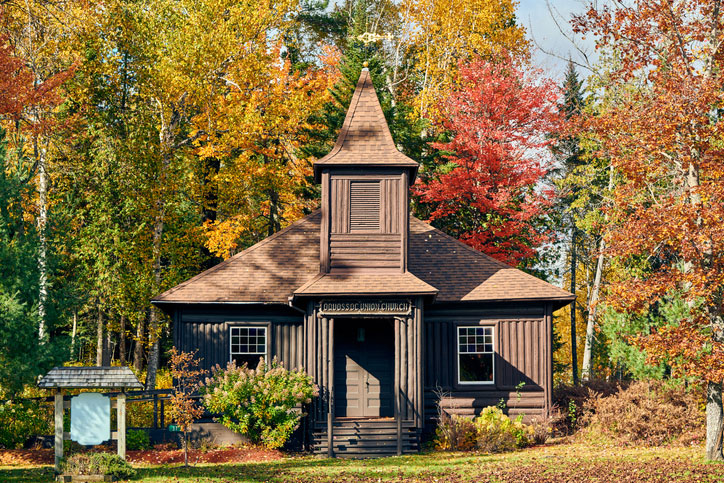
There’s woods, then there’s forest – a staple of Maine’s natural beauty. Its dense wilderness is as enrapturing as its expansive coastline. God’s work is rich in the Pine Tree State, a cradle of wilderness that reminds us of his power.
Given the state’s inspiring natural beauty, it’s not surprising that ambitious young Christians here show interest in pursuing the life of a pastor. What’s more, the people of Maine need your guidance now more than ever. Drug-related deaths have been increasing steadily since 2014, reaching an all-time high in the beginning of 2021.
 For all the beauty Maine has to offer, its residents are suffering. The ministry can alleviate these tribulations, empowering individuals to pull themselves out of addiction and face hardship with optimism. From York to Caribou, there’s an opportunity for you to serve God and your neighbors here.
For all the beauty Maine has to offer, its residents are suffering. The ministry can alleviate these tribulations, empowering individuals to pull themselves out of addiction and face hardship with optimism. From York to Caribou, there’s an opportunity for you to serve God and your neighbors here.
Explore a Christian Ministry Degree – Request More Info Today!
At the same time, you may not know where to start. If you’re ready to learn how to become a pastor in Maine, do you need any licensing? What about a degree? We’re here to take you through the whole process step by step.
Steps to Become a Pastor in Maine
Step 1. Earn a Bachelor's Degree in Christian Ministry, Pastoral Studies or Other Similar Major in Maine
Like any other career, you'll have to work your way up to eventually become a pastor, earning the position through experience and education. You may already volunteer at your church. That's great experience, but you'll need a bachelor's degree in Christian ministry, pastoral studies, or a similar major for most full-time positions in ministry that will give the experience you to build on to eventually become a pastor.
Christian ministry and pastoral studies are two sides of the same coin. Both majors cover the Old and New Testaments, Christian theology, the history of the church, ministry of proclamation, and even how to council families. No matter what school you attend, a degree in Christian ministry or pastoral studies will cover courses in everything from scripture to practical ministry and community outreach.
A Christian bachelor's degree will prepare you to be a strong spiritual guide and church manager. You'll not only learn how to read, interpret, and preach the Bible's teachings, but also understand how to both lead a congregation and connect with each individual within your circle of influence. This includes setting up events, maintaining the facilities, and even basic accounting.
A more scripturally focused degree in theology or Bible studies can also be a strong option, especially given Maine's strong religious demographic, a place where 14 percent of adults ascribe to evangelism.
Step 2. Look for Ministry Jobs and Gain Experience Serving the People and Churches of Maine
After obtaining your degree, the next step is to find a job. Keep in mind that you can find jobs in Christian ministry that allow you to work in a religious or administrative capacity. If you have a mind for management, then serving as a director in your church may be something you excel.
As far as religious positions go, you've got quite a few options. The one that should be top of mind is a job as an associate pastor. In this position, you'll work under the direct tutelage of a head minister, learning everything there is to know about running a church. Associate pastors lead sermons, plan worship ceremonies, and consult individuals looking for spiritual guidance.
A job as a youth pastor is another option. Youth pastors work with kids of all ages, setting up volunteer opportunities and faith-based activities to strengthen their faith in God. Most importantly, it gives you an opportunity to help struggling youth find the righteous path forward.
Salary Expectations for Church Ministry Jobs in Maine
Although data isn't available for Maine, we can gain some insight into what you'd earn at a national level. Across the country, religious workers earn an average $40,070 per year. Even in Portland, that income can keep a roof over your head. If you live toward Bangor, west of York, or north towards Caribou, that living will get you farther than most.
Step 3. Earn a Master of Divinity (MDiv) or Similar Graduate Degree in Maine and Establish Your Role in Christian Leadership
Eventually, you'll be inspired to take the mantle as a head minister. Achieving this position requires rigorous academic study, and expanding your understanding of Christ to a level only few attain.
This study usually culminates in a Master of Divinity (MDiv) or similar Christian graduate program. These programs typically take four to six years to complete, covering everything from church management to Biblical interpretation. Many MDiv programs require students to participate in a foreign mission and obtain a residency under a head minister. In addition, you'll be expected to complete courses such as:
- Church management
- Pastoral care and leadership
- Biblical interpretation
- Old and New Testament analysis
An MDiv program isn't your only option, either. A master of transformative ministry, Christian studies, or similar focus will serve you just as well. Transformative ministry emphasizes salvation through the acceptance of Christ, while Christian studies delve into the history and tenants of the religion. Either way, you'll be set up for a pastoral career by the time you finish the program.
Salary Expectations for Pastor Jobs in Maine
What could you expect to make behind the pulpit? In Maine, clergy members earn an average $55,040 annually – a pretty decent salary for any place in the state. Clergy members with the most experience bring in considerably more: the top 10 percent reported making more than $76,700 in 2020..
Step 4. Consider Forming a Christian Ministry of Your Own in Maine
As you build experience, you may discover a need for God's work in an untouched part of Maine. The Forks, Oxbow, Brownville, and countless other small communities may not have a church within 20 miles. That's where you can fill in the gap.
But to start your own church, you need to get your legal affairs in order. The first step is to receive recognition of exemption from federal income tax. After all, you're running a religious organization.
Receiving 501(c)(3) Exemption
501(c)(3) of the Internal Revenue Code states that religious organizations and other nonprofits are exempt from paying federal income tax. Technically, you don't have to apply for recognition, but we recommend doing so just to keep everything above board.
To receive your exemption, you first need to obtain an Employer Identification Number (EIN). An EIN allows you to file documents with the IRS. Then you can fill out Form 1023. This is the application for recognition of exemption. We'd suggest hiring a tax advisor to help you out with this step. It'll take a lot of the headache out of the process.
File Your Articles of Incorporation
Incorporating establishes the overarching mission of your church, assigns responsibilities to officers, and names trustees who will keep your congregation honest and accountable. The articles will include:
- Your name and mailing address.
- The address of your church.
- The stated purpose of your church.
- The names and addresses of anyone you’re incorporating with.
- The names and addresses of the trustees.
In Maine, you’ll need to identify your church as a public benefit corporation. The state defines a public benefit corporation as one designed to serve the public or community at large.
In addition, the state requires you to list the provisions through which the church will govern its internal affairs. It also mandates that you clarify how your assets will be distributed in the event of the congregation’s dissolution. In your case, you must specify that all church assets will be distributed to other similar congregations.
Reach Out to Multiply Maine
Multiply Maine is a nonprofit organization whose sole mission is to see “a gospel reaching church in every community in Maine.” The organization assists church planters with setting up congregations in underserved communities. They’ll be a good resource for you to network with other churches throughout the state, and could help you get up and running.
Insure Your Church
Before opening your doors to the public, it’s recommended that you obtain liability, property and automotive insurance. If you plan on employing individuals, workers’ compensation is also a necessity. You don’t want to have to tap into charitable donations to pay for any penalties targeted your way.
Start Spreading the Good News
Maine needs you. From the Canadian border to the Atlantic coast, there’s whole communities in need of your wisdom. Love can be found in God, but only you can bring the suffering toward his embrace. It’s time to get to work.
2020 US Bureau of Labor Statistics salary figures and job market trends for Religious Workers, Church Directors, and Clergy based on state data, not school-specific information. Conditions in your area may vary. Data accessed January 2022.
Christian Colleges in Maine
Saint Joseph’s College of Maine
BA in Theological Studies (online)
Master of Divinity (online)
MA in Theology (online)
- Pastoral Theology
- Sacred Theology
- Advanced Diaconal Studies









